Search
Showing 10 of 1193 results for Value-priced treatments https://simplemedrx.top
-
NZIEC KI TUA theme and early bird registration prices announced
The 31st New Zealand International Education Conference KI TUA 2024 (NZIEC KI TUA) will be held in Te Whanganui-a-Tara Wellington from 6 - 8 August at Tākina Convention Centre.
The theme for this year’s conference is Te Ara ki te Ao.
Step into a world of boundless possibilities at NZIEC KI TUA 2024 where we will delve into the heart of ‘Global Growth Unleashed' and the transformative power international education can bring in today’s world of unprecedented connectivity.
Early bird registrations for NZIEC KI TUA 2024, will be available very soon so keep an eye out for future communications or visit NZIEC 2024 from early March.
Registration Costs for NZIEC KI TUA 2024
2024 Early bird registration
$725 incl GST
Two-day conference, Welcome Function and Farewell Hour
2024 Standard registration
$800 incl GST
Two-day conference, Welcome Function and Farewell Hour
2024 Gala Dinner
$150 incl GST
Inc drinks, nibbles and 3 course dinner
1 day rate early bird
$375 incl GST
One-day conference, Welcome Function or Farewell Hour
1 day rate standard
$400 incl GST
One-day conference, Welcome Function or Farewell Hour
-
Reflections from English Teachers in South Korea
In January 2024, six New Zealand teachers were selected to spend part of their summer season teaching English in South Korea as part of the New Zealand Korea FTA Partnership English Language Training Programme.
This programme is supported by Education New Zealand Manapou ki te Ao (ENZ) who assists with the teacher recruitment process. This was one of the key KNZFTA programmes recently discussed during the South Korea Government delegation visit to New Zealand late last year.
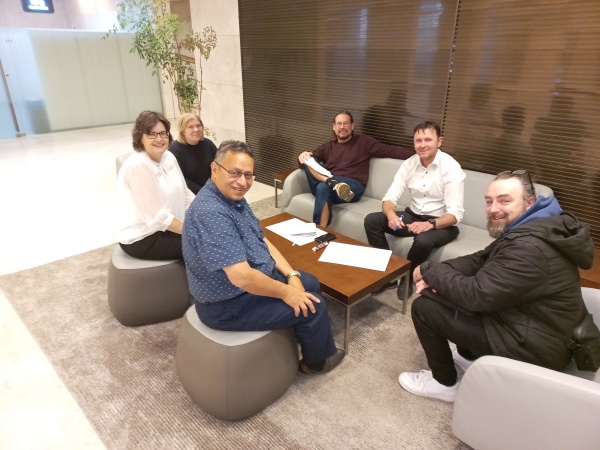
The group of six New Zealand teachers selected to teach English in South Korea in January. From left, Jane Bassett, Food Technology Teacher from Havelock North Intermediate School, Sharon Powell, English Teacher from Long Bay College in Auckland, Kara Shortland, Acting Team Leader (Bilingual) from Whangārei Intermediate School Te Tai Tokerau. Glenn Cheyne, Head of Learning Area Social Sciences from Nayland College in Nelson, Gordon Sim, Social Science teacher from Hillcrest High School in Hamilton, and Dan Greer, Social Studies/Drama teacher from Logan Park High School in Dunedin.
Kay Lee, ENZ Senior Market Development Manager – Korea, said that it was an absolute pleasure to see New Zealand teachers continue to travel to South Korea to teach English during their summer break.
“There are so many positive outcomes from the running of this cross-cultural programme for both the Korean students and the New Zealand teachers participating.
"On one hand, the students get the opportunity to hone their English language skills while experiencing the New Zealand teaching style, learning more about New Zealand, including its culture and education system. Meanwhile, while teaching English and serving as ambassadors of a New Zealand education, the teachers can immerse themselves in Korean life for a few weeks, seeing new sights, trying new food and making new friends.

Gordon, Jane, and Dan, sampling Korean cuisine at the end of the teaching day.
"Our Korean government partner for educational programmes, EPIS, has acknowledged ENZ for its significant contribution to the programme’s success through effective teacher recruitment. These positive outcomes are testament to the strength of our NZ-Korea Government-to-Government partnership,” added Kay.
Upon their return to New Zealand, two of the teachers who are trained in teaching English as a Second Language (ESL), shared their experiences with ENZ. Read on to hear about the reflections from their two weeks abroad....
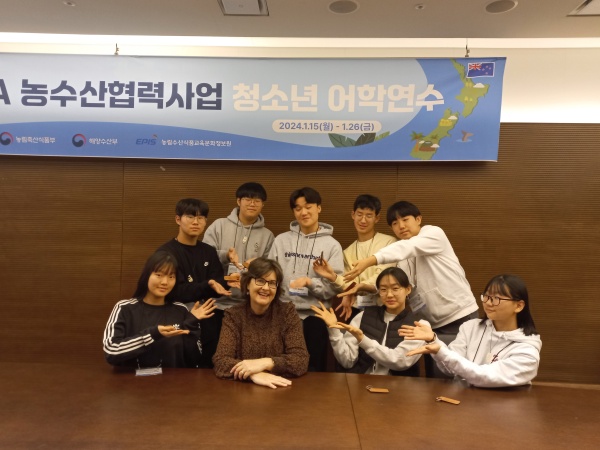
Jane Bassett (지안 (Jian) from Havelock North Intermediate School with her students.
Jane Bassett is a Food Technology teacher at Havelock North Intermediate School and said that the experience of exchanging cultures whilst teaching in an overseas classroom environment was an absolute privilege.
“Our students were aged 14 – 17 years old and came from all over South Korea with family backgrounds in the Agricultural and Fisheries industries. Each student had been awarded a scholarship from the Korean government to attend the two-week intensive English programme organised by the Hyundai Research Institute.
"The Institute went above and beyond in their efforts to ensure an incredible experience for both the students and our group of teachers.
“The teaching programme included a wide range of modules and as well as English grammar, we covered lessons on New Zealand culture, history, tourism, agriculture, sports, famous New Zealanders, and school life. My class was also exposed to the New Zealand Technology curriculum and was tasked with developing a new snack product. As part of the project, I introduced them to several New Zealand snacks and Kiwi classics such as WeetBix, Marmite and Watties Baked Beans, to varying degrees of enjoyment!”
Students were encouraged to speak in English throughout the day via fun-games, readings, conversations and plays so that the teachers could fine-tune their English to help them become more fluent with more natural English phrasing.
"We also explained aspects of Māori culture and the significance of pepeha (way of introduction). The students, who were from agricultural and fisheries backgrounds, were quickly able to identify their own awa (river) and maunga (mountain), showing their own personal connection to their land.”
Jane said that a personal highlight was being able to spend her birthday in Seoul learning about Korean cuisine through a cooking class on kimchi making and tea ceremony in a traditional house. She admitted that this was an appropriate birthday experience for a New Zealand Food Technology teacher!
She summed up the experience by saying that the group of teachers gained a greater understanding of cultural diversity and appreciation of the challenges learning English poses for new learners, learnings which they will take home with them.
“We really hope that our students will remember their experience as fondly as we will and that they will look to study and visit New Zealand in the future.”
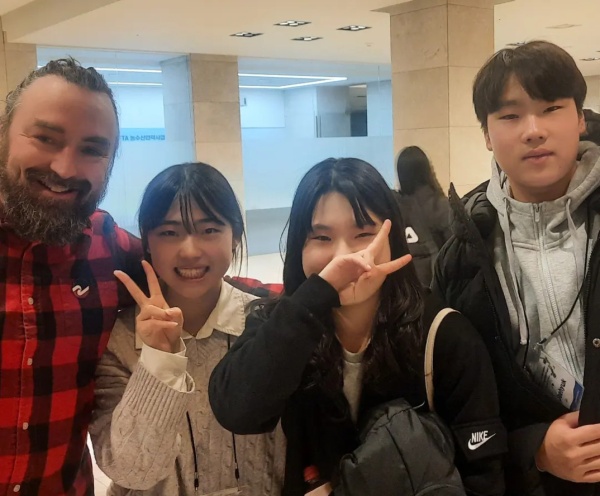
Drama and Social Studies teacher, Dan Greer, of Logan Park High School with three of his students.
Dan Greer, is a drama and social studies secondary school teacher from Logan Park School in Dunedin. He joined Jane as one of the six teachers selected to travel to South Korea, his second experience as an English language teacher in South Korea, having taught in Ulsan 12 years ago.
“I had such an amazing time participating in the Hyundai Research Institute’s programme. It was great to have other quality teachers on this experience with me and we were able to work together, mixing up the style of teaching and activities. I had the more beginner level class, and as a drama teacher we added games to my traditional English teaching. The students really enjoyed it, and it gave them more confidence to give things a go”.
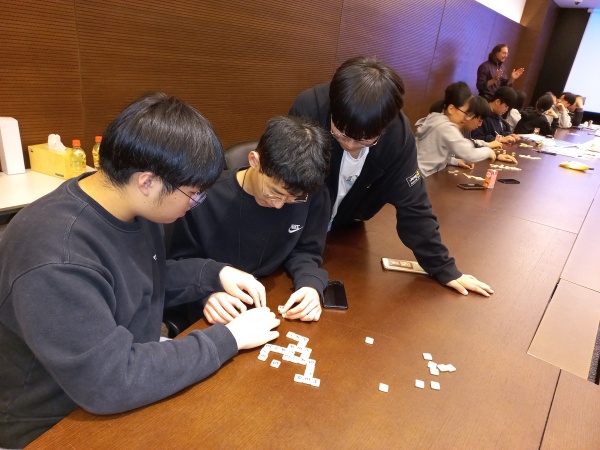
Dan reflected on the fact that there was one practice of teaching English in Korea that he had often thought was a little unfair, that being the naming of Korean students with English names.
“As an English teacher in Korea, you are often asked to name Korean students with English names. Sometimes this is because they want them, sometimes it is because they ’have’ to, and for many it is because westerners find Korean names hard to pronounce. I have named nine children in my life, one being my daughter and the other eight have been my Korean students”.
Dan used this practice as a topic of discussion in class one day and shared his opinion that it had not always felt right to him as he felt that if Korean students were taking the time to learn the English language, that teachers should make an effort in return.
He then asked his students whether English teachers should have Korean names. This prompted them to ask many questions about Dan including who he is when he is not “Dan the teacher”, his whakapapa, and the meaning of his name in English.
Dan said “You can imagine my surprise when my students were all waiting for me when I arrived the next day. One wonderful student then stood up and using perfect English gifted me a Korean name. I was no longer just “Dan the Teacher,” but also now 도혁 (Dohyuk), which meant I was ‘leading them to a bright path’.
“This was such a humbling experience that I will cherish forever. For me, this is what makes teaching and life so special,” added 도혁 (Dan).
If the Korean organisers decide to run the NZ-Korea FTA Partnership English Language Training Programme in the future, ENZ will continue to share the applications with NZ school teachers through the Asia NZ Foundation and Schools International Education Business Association (SIEBA).
-
Successful New Zealand – India Education Connect Initiative held in India
New Zealand – India Education Connect took place from 8 to 14 February, involving a high-level sector delegation made up of Vice Chancellors, Deputy Vice Chancellors, International Directors, academic heads, and regional recruitment staff from all eight New Zealand universities.
Led by Lisa Futschek, ENZ’s General Manager International, the delegation visited Bengaluru, Chennai, New Delhi, and Ahmedabad. During the visit, ENZ signed two Education Cooperation Arrangements (ECAs) and one Memorandum of Understanding (MoU), with the Higher Education Department, Government of Karnataka; Indian Institute of Management Ahmedabad (IIMA); and Gujarat International Finance Tech City (GIFT City) respectively. The ECAs and MoU provide a high-level umbrella arrangement for New Zealand universities to explore potential collaborations with each of the partners.
The New Zealand delegation with IIM Ahmedabad officials on 14 February.
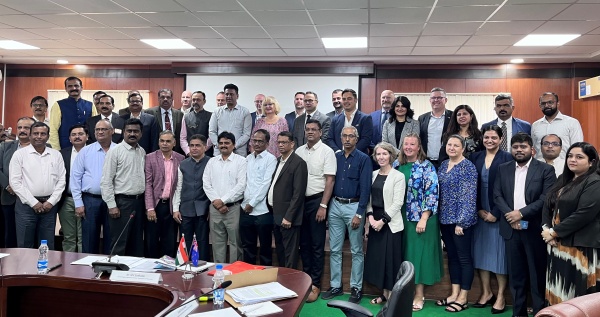
New Zealand universities delegation with Hon Dr. M C Sudhakar, Minister, Karnataka Higher Education Minister and officials of Karnataka Higher Education Council, Bengaluru on 8 February
Ms Futschek acknowledged the special relationship India and New Zealand have, noting that this year marks the 72nd anniversary of diplomatic relations between the two countries.
“India consistently holds the position of the second-largest international student market for New Zealand. The dynamic growth in the education partnerships between our two countries is attributed to strategic investments by universities, marked by heightened levels of internationalisation and strengthened commitments through the establishment of in-country representatives/offices by all eight.
“There is certainly much to be said for having power in numbers. Engaging as a group is a very good way to leverage connections with key government and private stakeholders that would otherwise be difficult on an individual institution basis,” said Ms Futschek.
The delegation visit to the New Zealand Centre at IIT Delhi (IITD) was one of the highlights of the programme as it facilitated discussions on resource mobilisation for long-term sustainability of the centre. The New Zealand Centre at IITD was established in February 2020 as a focal point for joint academic activity between New Zealand's eight universities and IITD. The centre is a research-focused hub that fosters collaborative, sustainable, self-supporting research programmes in areas of shared national interest such as climate change, disaster management, urban planning, and the environment. The first big engagement at the New Zealand Centre included 10 joint research projects between NZ universities and IITD academics in 2022. Subsequently, a fellowship programme with a joint funding of NZ$ 100,000 was announced in 2023, and as part of this programme four New Zealand Fellows will be spending time working with IITD in 2023/24 and two IITD Fellows with New Zealand universities.
Ms Futschek noted that the New Zealand Centre at IITD is a great example of how the cohesion between our eight universities and IITD has led to a flagship project growing in scale and sustainably.
“This success has all happened while building our reputation for quality education and a commitment to bilateral relations between our two countries,” added Ms Futschek.
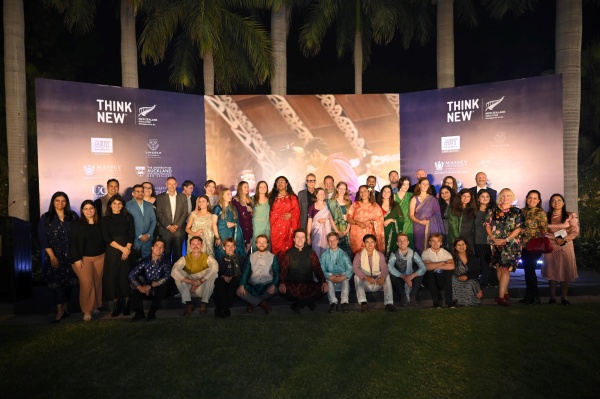
The networking reception organised by ENZ in Delhi during the ENZ Connect series, was attended by a group of 24 students from University of Auckland, University of Waikato, Massey University and Victoria University of Wellington, who were in India as part of the PMSA India immersion programme. They not only engaged with the ‘friends of NZ’ attendee, but also performed a Bollywood dance they had learnt during their six weeks in India, much to the delight of the audience.
Other activities conducted during the week included a media roundtable, led by H.E. Ambassador David Pine at the New Zealand High Commission in New Delhi. The roundtable reached over 984 million people with a PR value of over NZD 624,000, further increasing the brand awareness of New Zealand’s world class education across India.
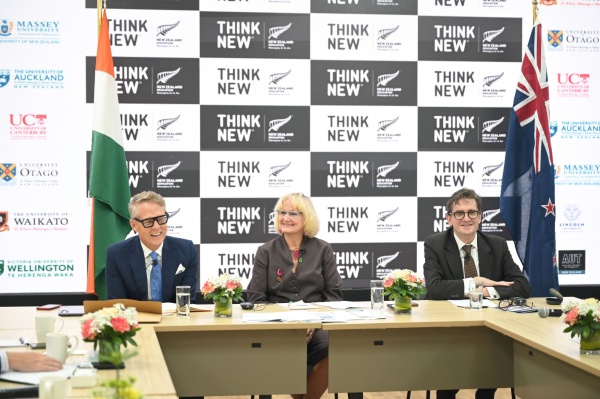
Media Roundtable at New Zealand High Commission in New Dehi, led by NZ High Commissioner to India, HE Mr David Pine, Lisa Futschek, GM International, ENZ and Brett Berquist, Assistant Vice-Chancellor Engagement University of Canterbury.
New Zealand universities also had a strong presence at QS India summit 2024, which coincided with the New Zealand – India Education Connect, helping delegates reflect their interest and achieve visibility in the Indian B2B space. ENZ was invited by QS to be a strategic partner at this summit.
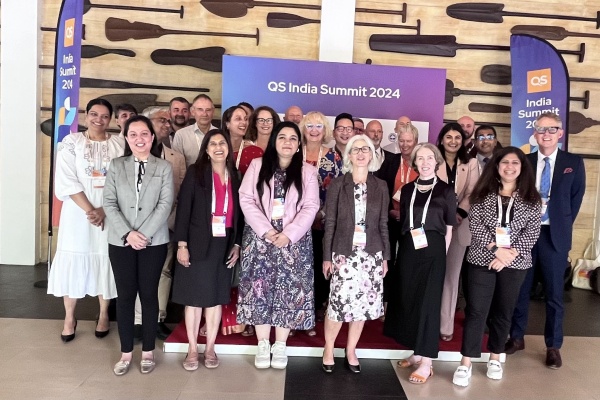
The delegation at the QS India Summit 2024.
-
New Zealand and Viet Nam sign Arrangement, strengthening education ties
This arrangement was signed by New Zealand Minister for Tertiary Education and Skills, Hon Penny Simmonds and Viet Nam’s Minister of Education and Training, Nguyen Kim Son during the Prime Minister of the Socialist Republic of Viet Nam His Excellency Phạm Minh Chính’s visit to New Zealand from 9 – 11 March. Prime Minister Pham and Prime Minister Luxon witnessed the signing of this arrangement, which covers the period 2023 – 2026.
The EEA, which will replace the Strategic Engagement Plan on Education (SEP) 2020 – 2023, identifies areas of engagement and sets new targets over the next three years.
Specific areas covered in the arrangement include collaboration and information exchange in English language training, short courses and executive education programmes that New Zealand provides in Viet Nam.
The arrangement will also explore opportunities to build mutual value in English language literacy, early childhood education and science, technology, engineering, and mathematics (STEM) disciplines. Sharing and publicising scholarship programmes in both countries will be undertaken while institutions will also be encouraged to increase research engagement as well as student, lecturer and research exchange activities.
Both countries have also agreed to actively support the activities of alumni groups in both Viet Nam and New Zealand, and celebrate the lifelong connections generated through these networks.
The signing of this arrangement with Viet Nam aligns with the New Zealand Government’s priority to revive international education, lift its contribution to New Zealand’s economy, and diversify international education markets. Concerted effort is going into deepening and broadening our overall bilateral relationship with countries in Southeast Asia including Viet Nam, including our trade and economic interests.
ENZ’s Acting Chief Executive, Linda Sissons, said the Education Engagement Arrangement provides an important opportunity to build on the longstanding education partnership between New Zealand and Viet Nam.
“Viet Nam is a multi-sectored market for New Zealand’s international education industry and an important source country for international students.”
“This arrangement demonstrates to prospective students and their families that New Zealand is a partner of choice for the Vietnamese Government in the field of education, which aligns with the New Zealand Government’s priority to build a more resilient and sustainable sector.”
“With its strong focus on partnerships, the arrangement also lays an excellent foundation for further growth by New Zealand’s tertiary sector. It presents real opportunities for our EdTech sector to continue to build on the recently completed market familiarisation trip, with further development of opportunities that support Viet Nam’s digital transformation strategy.
Bilateral meeting between New Zealand and Vietnam during the Prime Minister of Vietnam, His Excellency Mr Pham Minh Chính's visit to New Zealand. March 11, 2024 in Wellington, New Zealand. Photo by Mark Tantrum.
The first Strategic Engagement Plan on education (SEP) was signed in 2015, laying the foundation for a strategic education partnership between New Zealand and Viet Nam. The SEP sits under our overarching bilateral Education Cooperation Arrangement between the Ministries of Education, which was refreshed in 2022. The SEP was renewed in 2018 and again for the period 2020 – 2023, between Education New Zealand and Viet Nam’s Ministry of Education and Training (MoET) and was signed during the year we marked the 45th anniversary of diplomatic relations with Viet Nam (2020). This built on existing education initiatives and identified new opportunities to be co-developed and delivered for the mutual benefit of both countries. You can read about the last signing of the Strategic Engagement Plan in 2020 signing here.
Following the signing of the EEA, both education ministers participated in a bilateral meeting to discuss the education relationship between the two nations, current priorities and the development of activities under the new arrangement. This discussion touched specific areas of collaboration such as early childhood education, institutional partnerships and vocational training.
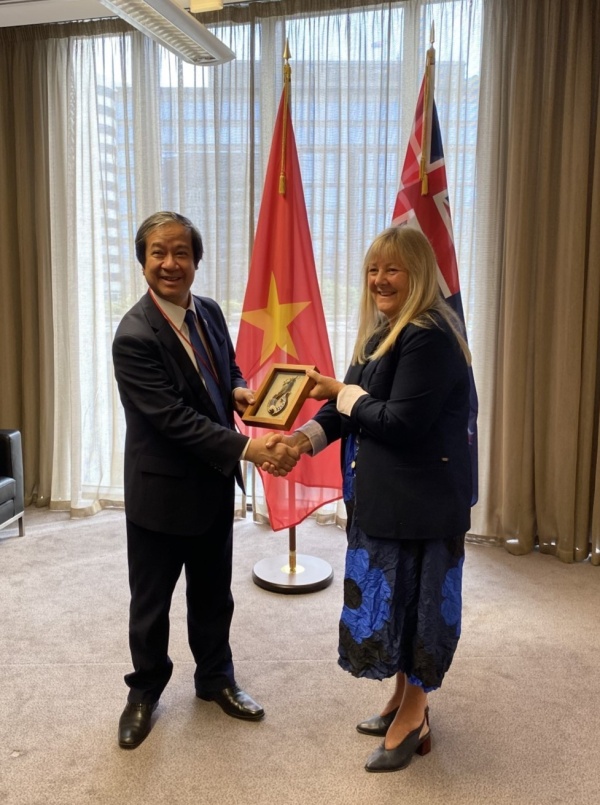
Minister Penny Simmonds present Minister Nguyen Kim Son a gift following the bilateral education ministers meeting.
New Zealand is offering Vietnamese students two government scholarship programmes for secondary school study (the New Zealand Schools Scholarships – NZSS) and for postgraduate study (the Manaaki New Zealand Scholarships). In view of increasing demand for study with New Zealand, ENZ has implemented a wide range of initiatives to equip Vietnamese learners with the 21st century skills, and support families in obtaining up-to-date information to plan for their study journey in New Zealand.
The New Zealand Education Day, ENZ’s flagship event, is scheduled on 19 and 20 October. It has been held annually since 2017 and attracts hundreds of visitors.
-
PIF Recipient: Boma
Christchurch-based Boma is a new kind of education provider, on a mission to support current and emerging leaders to be more intentional, intelligent, and courageous for the future. Boma runs events, workshops, and courses, and has worked with leading organisations in Aotearoa and around the world, from global tech companies Facebook and Zoom to locally based organisations such as Meridian Energy, Stuff, and New Zealand Trade & Enterprise.
But it’s the next phase of Boma’s expansion that’s really set to make waves on the world stage. Thanks to an award of funding from the International Education Product Innovation Fund, Boma is creating a global, cohort-based course for rugby coaches delivered in partnership with The Crusaders – the Christchurch-based professional rugby team and the most successful team in the history of the Super Rugby competition.
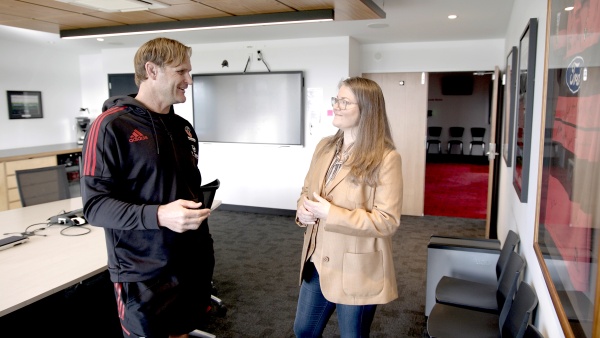
Founder and CEO of Boma NZ, Kaila Colbin with Crusaders Coach, Scott Robinson
"We at Boma are so excited to be working with Education NZ and the Product Innovation Fund. We share so many things: a commitment to excellence; an agile test-learn-iterate approach; and a passion for bringing Aotearoa's special sauce to the world. We're honoured to have been chosen as one of the recipients of the fund, and we know we'll be able to go farther, faster by working together".
Kaila Colbin , Founder and CEO, Boma New Zealand
Aimed at rugby coaches from high school teams through to professional level, the Crusaders Coaching Leadership Programme™ will run for the first time in late 2022. Unlike competitors who offer training through on-demand video but generate low completion rates, Boma’s pilot project with The Crusaders combines the flexibility of self-directed learning with the accountability of being part of a real-time cohort of learners.
Education New Zealand Manapou ki te Ao (ENZ) is the agency behind the Product Innovation Fund. As New Zealand’s dedicated government agency for international education, ENZ is helping shape a broader, more diverse international education sector with built-in resilience to future shocks such as global pandemics.
In total, seven pilot projects have been supported through the Product Innovation Fund. Together, they reimagine what a New Zealand education experience could look like and mean for global learners. Boma’s pilot project, for example, taps into a new audience – rugby coaches around the world looking to learn ‘The Crusaders Way’. Before COVID-19, rugby coaches from around the world would travel to New Zealand to learn what makes the team so successful.
By partnering with Boma, The Crusaders will be able to share their rugby and leadership expertise with learners around the world through a course offering that is high quality, consistent and scalable.
Boma has big plans for the future and sees a logical path for its course offerings to grow from rugby leadership into sports leadership, to business leadership and then into general leadership. Boma’s approach to learning is as much values-led as it is content-led, and this sets Boma apart from its competitors.
The support from ENZ through the Product Innovation Fund for Boma’s first pilot project with The Crusaders may well pave the way for more to follow. With a goal of building the leaders the world needs, Boma sees an opportunity to partner with other well-respected, values-led organisations like The Crusaders to create transformational, immersive learning experiences from New Zealand to the world.
More information:
-
PIF Recipient: Chasing Time English
Across the world, there is a vast market for English language learning. To put a number on it – around one billion learners. In many countries, though, English is taught through repetitive, mostly grammar-based content. The result is two-fold: students become disengaged and disinterested, and they advance in writing and reading skills at the expense of speaking skills.
Chasing Time English is a New Zealand company on a mission to make English language learning engaging, exciting, and effective for educators and students around the world. How? Through video. The team at Chasing Time English believe that English language classes should excite and inspire students to learn more, and decided video was the best medium to achieve this.

Chasing Time English uses engaging video story content to educate learners.
Through original, live-action-drama videos, Chasing Time English brings intrigue, humour, surprise and suspense into learning. Redrawing the line between education and entertainment, the short videos produced by Chasing Time English are designed to stand alone as quality entertainment, with strong learning outcomes embedded throughout.
To achieve this feat, the company brings together a team of English language educators, applied linguists and filmmaking professionals, who collaborate to create compelling, narrative-based drama content backed up by a cutting-edge pedagogy.
While other education publishers also produce English language learning video content, this is often lower quality video with limited learner appeal and retention. By creating professional quality drama content, Chasing Time English has become a market leader in English language video learning. Captivate learners, and the learning will follow.
Chasing Time English is one of the successful recipients of funding from the International Education Product Innovation Fund, a New Zealand Government-funded initiative to support pilot projects that reimagine and rethink what a New Zealand education experience can look like and mean for global learners. Education New Zealand Manapou ki te Ao (ENZ) is the government agency responsible for international education and is managing the Product Innovation Fund.
ENZ will work in a partnership approach with each successful recipient, sharing skills, expertise and resources to help each pilot succeed and develop into a self-sustaining education offering. The lessons learned through the pilot projects will be shared for the benefit of New Zealand’s entire international education sector, with a view to encouraging innovative, new offerings for international learners to experience a New Zealand education.
The Product Innovation Fund award will enable Chasing Time English to design, develop and deliver a new set of programmes for high beginner to elementary English language learners and educators. Target audiences include New Zealand education institutions with offshore partners, high schools in Japan and the Netherlands, and English language teachers at the post-beginner level.
Across two programmes of 10 weeks each, learners will be able to access up to 100 hours of engaging resources, including Chasing Time English’s distinctive video content, along with other audio and video resources and communication-based activities. The new set of programmes will incorporate a strong New Zealand theme, sharing New Zealand storytelling and themes of environmental sustainability and innovation. The original video content will also showcase New Zealand’s spectacular natural scenery, helping inspire learners and build a connection with New Zealand, wherever they are in the world.
With the support of ENZ through the Product Innovation Fund, Chasing Time English is set to continue growing its impressive offering for English language learners around the world. Already setting the bar for the quality of its learning resources and pedagogy, this Kiwi education provider is showing that online learning can be fun and effective, while also showcasing New Zealand’s landscapes, people and values to learners wherever they are.
More information:
-
PIF Recipient: Tokona te Raki
Tokona te Raki has already led some brave pioneering work, such as challenging streaming in schools based on evidence it has a largely negative impact on Māori students, more often perpetuating inequity, rather than reducing it. They are working on indigenous youth pathways into digital futures, understanding future tribal skill needs and honing tribal innovation models.
With global challenges like climate change, shifting population demographics and the impact of technology all combining to create both uncertainty and opportunity, the future is there for the taking – or rather the shaping.
Tokona te Raki is an indigenous social innovation lab operating under the mana of Te Rūnanga o Ngāi Tahu. With over 76,000 registered tribal members and a territory covering over 80 percent of New Zealand’s South Island /Te Waipounamu, Ngāi Tahu is the largest iwi / tribe in Te Waipounamu.
With Māori youth being the fastest growing sector of the Aotearoa New Zealand population, Tokona te Raki is on a mission to tackle inequities they face in their journey through education and into enterprise and employment. Through projects with whānau, communities, and external partners, rangatahi are equipped and empowered with the tools and support to shape and be inspired by their futures, succeeding as Māori.
Their latest project is an ambitious one: to reimagine international education. With support from Education New Zealand Manapou ki te Ao (ENZ) as a Tiriti partner, through the International Education Product Innovation Fund, this vision to reshape indigenous education is moving closer over the horizon with a view towards a future where youth are confident, competent, and connected both tribally and globally.
‘Indigenous Future Making’ is a pilot project to reimagine the future of international education towards an indigenous vision of a tribal and global learning network. Te Ao Māori (the Māori world) and its knowledge systems create an identity unique to Aotearoa and sees the future as an opportunity rather than an inevitability.
To frame the project, Tokona te Raki has identified several ‘shifts’ that transform what international education can deliver for indigenous communities and learners. From colonial and Euro-centric to diverse, indigenous, and global; from physical, site-based delivery to place based and virtual delivery; from fixed-duration courses to lifelong learning; from rational (IQ) intelligence to emotional, cultural, and digital intelligence; and from narrow credentialling to flexible and adaptive credentialling.
Instead of framing international education through an economic lens and thinking of international learners in terms of revenue extraction, the pilot project imagines values-based value generation, a reciprocal, two-way street of learners travelling both into and out of Aotearoa New Zealand, education contributing to global challenges and collective action, and Aotearoa New Zealand being recognised for its unique value proposition: a caring, safe, secure, innovative and culturally relevant education provider.
The project will deliver an indigenous future-making framework, backed up with a toolkit and a curriculum. An online platform will be explored to serve as an indigenous knowledge exchange, facilitating the transfer of knowledge between and within Māori and other indigenous cultures.
Tokona Te Raki is among a range of pilot projects supported by ENZ’s Covid Response and Recovery Fund funded product and service diversification workstream. This New Zealand Government-funded initiative to encourages the development of new products and services in the international education sector.
The project explores how Aotearoa New Zealand can offer indigenous solutions to global challenges, such as climate change and social inequality. More than a funding contributor, ENZ is working with Tokona te Raki to explore what being a good Tiriti partnership should look like to best support and realise the full potential of an Iwi led project, leveraging each other’s networks and capabilities. The learnings from Indigenous Future Making, and the other pilots, will be shared for the benefit of Aotearoa New Zealand’s wider international education sector, encouraging other education providers and organisations to keep innovating for the future.
Learn more:
-
New Zealand star of the show in leading Brazilian international education magazine
In late April, the Consulate-General of New Zealand in São Paulo welcomed professionals from the international education sector for the launch of Belta's magazine ei – International Education. The event served to celebrate New Zealand as the magazine's feature country and was attended by government officials and Brazilians who studied in New Zealand institutions and now hold prominent positions in their professional fields.
Belta (Brazilian Language and Travel Association) brings together the leading Brazilian agencies offering travel programmes focused on international education. Agents associated with Belta are recognised for the safety and excellence of the services they provide to students.
The New Zealand delegation from Universities New Zealand, composed of representatives from five of the country's eight universities, and CAPES LATAM were present at the Consulate for the magazine launch event during their stay in Brazil for strategic meetings at FAUBAI 2024, Brazil's largest conference focusing on higher education.

ENZ’s Bruna Natale with the delegates from New Zealand.
Belta's publication is a quality reference for those seeking information about studying abroad. It is published annually and serves as a guide for those interested in experiencing international education. It is distributed at exchange fairs, travel agencies, and schools throughout the year. This is the third time that Belta's magazine has featured New Zealand's international education on its cover.
The guests were welcomed by the Ambassador of New Zealand in Brazil, Richard Prendergast, the market development manager of Education New Zealand Manapou ki te Ao (ENZ) in Brazil, Bruna de Natale, and Belta's president, Alexandre Argenta.
"Aotearoa New Zealand is open to Brazilian students, offering excellent education, institutions that prepare for future challenges, and a great quality of life, with safe cities and a friendly population," said Ambassador Prendergast at the event's opening.

Guests watch Ambassador Richard Prendergast’s speech.
Bruna de Natale states, "Highlighting New Zealand education in Belta's magazine is essential for Brazilians to be aware of the quality of education offered in Aotearoa New Zealand." Bruna also emphasises that "the magazine directly engages with the audience interested in studying abroad, reaching exchange fairs and agencies from all regions of Brazil, so it is a strategic visibility for positioning the quality of New Zealand education."
Representatives from exchange agencies who attended the reception conversed with members of the Universities New Zealand delegation and Brazilians who had studied in New Zealand.
"We have strong connections with Latin America in general, and especially with Brazil, but we want to strengthen and expand these partnerships," said Bronwen Kelly, Deputy Chief Executive of Universities New Zealand. Participating in strategic events, like today's launch and the FAUBAI conference, is a significant step towards bringing our institutions closer together and paving the way for academic exchange," Bronwen added.
In addition to Alexandre Argenta, Maura Leão, Director of International Relations at Belta, attended the event. Both were in New Zealand in March on a familiarisation trip organised by ENZ to introduce the country as an education destination.
"I've just returned from a fantastic experience in New Zealand," said Maura Leão during the event. "It's a country with many wonderful opportunities for students. I visited schools, universities, English language schools, and high schools. The experience was very positive. For us who work in education, it's essential to have this opportunity to share impressions with families who want to send their children to study abroad," said the executive.
The online version of the magazine can be found here: Revista ei! 2024 by Associação Belta - Issuu

Bruna de Natale with Belta’s International Relations Director, Maura Leão.
-
Opportunity for New Zealand and German academics to collaborate
The third funding round for the Programmes for Project-Related Personal Exchange (PPP) programme is open now. The programme supports early-career academics from New Zealand higher education institutions to travel to Germany and engage in research projects.
The PPP programme was established in 2021, when ENZ and the German Academic Exchange Service (DAAD) signed a Memorandum of Understanding.
Amy Rutherford, Regional Director Americas, the Middle East and Europe said the programme aims to strengthen academic relations between New Zealand and German institutions and to promote cooperative and complementary research activities.
“It enables young academics to not only further their careers, but also expand New Zealand’s international research links” she said.
The programme aims to fund group exchanges involving two to four researchers per country and covers all subject areas. It invites researchers to think of a project that would particularly benefit from working with German academic counterparts.
University of Otago Professor Chris Button is a recipient of PPP funding from the 2023 round and is working with Dr Robert Rein from the German Sport University in Cologne.
They are undertaking research that aims to provide evidence-based advice on how to promote water safety and prevent drowning.
Chris and his counterpart identified that drowning is a major cause of accidental deaths worldwide and is noted as one of the key challenges in the United Nation’s commitment to achieve global, economic, social and environmentally sustainable development.
The pair have observed a gap in academic literature about the potential benefits of floating, versus treading water or swimming when someone is in trouble in the water. They have collected a series of samples from 200 participants in New Zealand and will publish their findings soon.
Chris said he’s grateful that the PPP programme has helped him reinvigorate a long-standing collaboration with Robert.
“I encourage others to take the opportunities this programme offers to connect New Zealand and German academics” he added.
Applications for the 2024 funding round close on 28 June 2024, click here to find out more and apply.
-
From the Acting Chief Executive: Cold temperatures, warm hearts
Tēnā koutou katoa
As a recent “polar blast” bought frost and icy conditions across New Zealand, my thoughts turned to the international students who arrived here in the warmth of summer. Living a long way from home in a different country is challenging enough without being subjected to freezing conditions. The good news is that all our research and everything we hear from our international students is that the welcome and manaakitanga they receive is universally warm.
In our Student Experience survey of 4,755 international students from the end of last year, more than 70 nationalities, 84 percent rated their overall experience positively, while another 83 percent said they would recommend New Zealand as a study destination.
Last Wednesday, along with our Chair, Tracey Bridges, we appeared before the Education and Workforce Select Committee comprising nine Members of Parliament. This happens every year. As a government agency it is part of reporting to Parliament. I am extremely heartened by the level of interest all the committee members had in international education. It is good to know the sector has advocates within Parliament.
Tracey has recently returned from Singapore, Thailand, and the Philippines as a member of the business delegation supporting Prime Minister, Rt Hon Christopher Luxon. Education was a big part of the Prime Minister’s itinerary, and it was great to have Tracey in the delegation. Throughout the entire trip we took every opportunity to emphasise the benefits of international education to the Prime Minister. A good example was in Thailand where ENZ hosted a series of engagements, including the New Zealand Alumni Networking Event. At this event the Prime Minister met 25 accomplished New Zealand alumni, who have made substantial contributions to the bilateral relationship between New Zealand and Thailand. You can read more about the visit in our E-News article here.
New Zealanders going offshore for an experience is an important part of international education and ENZ’s work. It is pleasing then to see 60 applications for the group round of the Prime Minister’s Scholarship for Asia and Latin America that closed 19 April 2024. Of the 60, 22 were for Latin America and 38 for Asia. The applications are being assessed and successful scholarship recipients will be determined in a few weeks’ time.
In summary it has been, as it always is, a busy and productive month across international education. May will be no different.
Waiho kia pātai ana, he kaha ui te kaha
Let the questioning continue; the ability of the person is in asking questions.
Keep warm everyone.
Dr Linda Sissons
Acting Chief Executive

